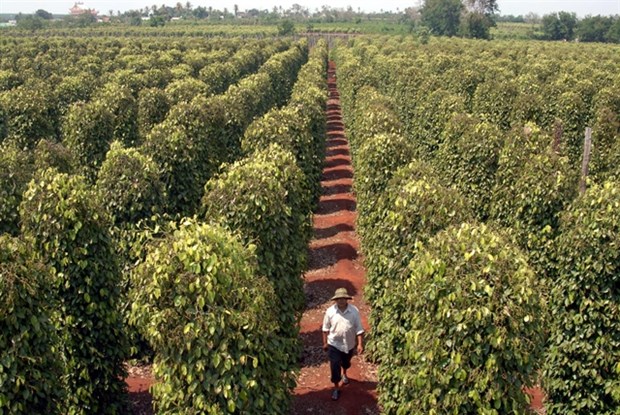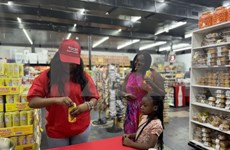Quality key to pepper growth, not quantity
For two decades, farmer To Nguyen Ho Hai in the Central Highlands province of Gia Lai grew peppers, enjoying a boon in production.
 A pepper farm in Chu Se district, Gia Lai province (Photo: VNA)
A pepper farm in Chu Se district, Gia Lai province (Photo: VNA)Hanoi (VNS/VNA) - For two decades, farmer To Nguyen Ho Hai in the Central Highlands province of Gia Lai grew peppers, enjoying a boon in production.
Five years ago, the industry was doing so well, and the price of peppers so high, he more than doubled his investment, increasing from 900 pepper pillars to 2,000.
At the time, farmers took their profits and reinvested with prices hitting as much as 260,000 VND (11.2 USD) per kg at their peak in 2015.
Hoang Phuoc Binh, Vice Chairman of the Pepper Association of Gia Lai province’s Chu Se district, recalled the time when peppers were hot in more ways than one.
“Every farmer, every household grew peppers,” he said. “The more profit they earned, the more money they poured in investing in buying land to grow more pepper.”
According to Vu Ngoc An, Deputy Director of the provincial Department of Agriculture and Rural Development, when people saw households making profits of up to 500 million VND (21,600 USD) per ha, others followed suit.
Everyone wanted a piece of the action, it was a gold rush for pepper producers.
But overproduction saw a staggering 97 percent of the area, some 16,300ha, being used to farm peppers and the bubble eventually burst.
Despite warnings, some farmers abused fertilisers in a bid to increase output and as a result, diseases broke out among crops, causing low yields and killing many plants.
Last year, pepper prices plummeted to as low as 40,000-45,000 VND (1.7-1.9 USD) per kilo, a fraction of the amount that was seen in days gone by.
As a result, a lot of pepper growers fell deep into debt.
Accounting for more than 40 percent of the world’s pepper quantity and over 60 percent of the world’s market share, Vietnam has been the worlds’ biggest pepper producer and exporter since 2001 with peppers exported to more than 100 countries.
Today the statistics paint a far bleaker picture, so for farmers like Hai, who invested a small fortune buying land, installing electricity lines, digging wells and purchasing other necessary equipment, times became tough.
Today you won't find peppers growing on his land, but instead coffee plantations alongside goats he raises.
Another farmer, Vo Hoai Nhon from Hoa Binh hamlet, also suffered as a result of the pepper crash, leaving him with debts totaling 300 million VND.
He even could not sell the lands used to cultivate the pepper. “The land used to cost 40 million VND (1,700 USD) per sq.m during the peak period but now no one wanted to buy,” he said.
But it is not all doom and gloom for pepper farmers. Some stuck at it, and using organic growing methods, have reaped the rewards.
Nguyen Tan Cong, CEO of the Le Chi Pepper Nam Yang Agricultural and Services Cooperative in Nam Yang Commune, Dak Doa district, said while the price of normal peppers dropped to 40,000-45,000 VND per kg in 2019, the price of organic pepper produced by his cooperative still reached more than 100,000 VND (4.3 USD) per kg.
It means that organic pepper products could be sold at a price 150-200 percent higher than normal products.
During the 2018-19 crop, his family earned 1 billion VND (43,000 USD) from growing 5ha of peppers.
The cooperative has 80 members who grow peppers on a total area of 100ha.
He said his cooperative has invested in growing pepper products that meet organic standards of the US and Europe. The cooperative’s products are sold for both domestic and foreign markets.
“However, the cooperative does not aim to produce en mass for export,” he said. “The most important thing is to ensure good quality so that the products will be sold at high price and to build a trademark in foreign markets.”
“All members of the cooperative are not required to grow organic pepper plants but they must ensure quality products and meet standards and market demands. That is the trend for sustainable development of this sector,” Cong said.
Vu Ngoc An, deputy director of the provincial Department of Agriculture and Rural Development, said local farmers should switch to organic cultivation to achieve sustainability.
The department has developed pilot models in growing peppers and coffee for local farmers to follow, he said.
Local authorities also encourage farmers to switch to grow other crops such as fruit on land that not suitable for peppers.
Tran Cong Thang, head of the Institute of Rural and Agricultural Development Strategy and Policy, said it was necessary to develop production areas that meet good agricultural practice and international standards as well as support farmers to switch to organic cultivation methods.
He pointed to the need to build effective market information and forecast system and increase promotion activities to export pepper to potential markets.
Deputy Minister of Agriculture and Rural Development Le Quoc Doanh urged the authorities of localities which are key pepper growers, to guide farmers to grow, take care and preserve pepper following organic standards to meet increasing requirements of foreign markets.
They should also encourage farmers to invest in modern processing technology and diversify pepper products to improve products value, he said./.












